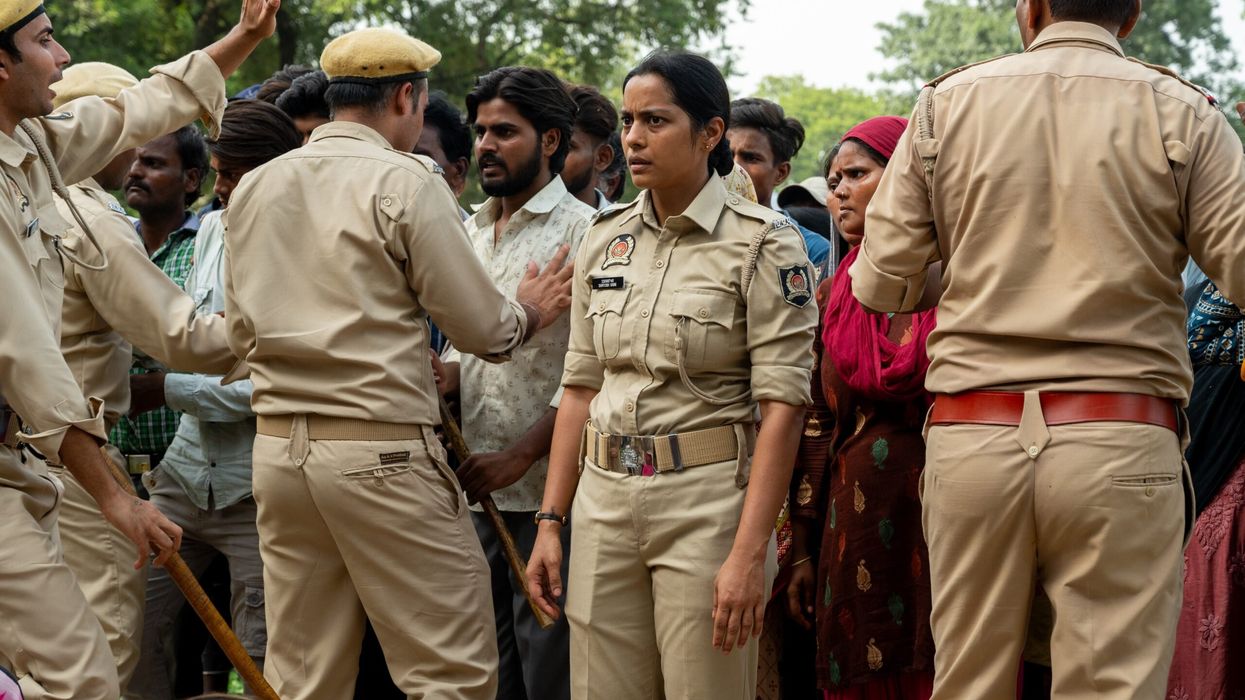BRITISH filmmaker Sandhya Suri had been searching for a meaningful way to discuss violence against women for a long time, until a powerful photograph inspired her.
While in India, researching and working with various NGOs, she came across an image from Delhi in the wake of the nationwide protests following the Nirbhaya gang rape case. The photograph captured a large crowd of angry female protesters and a line of female police officers, forcing them back.
“One of them had such an enigmatic expression, I was fascinated by her. What a gulf between her and those protesting, what power her uniform wielded, and what powerlessness not to feel safe as ordinary women. To explore this violence and her power within it felt exciting,” said Sandhya Suri.
This led to the British Asian filmmaker researching female police constables and learning about a government scheme of ‘appointment on compassionate grounds,’ where eligible dependents of deceased police officers can inherit their jobs. She said: “During my research, I spent time with many such widows. Some had previously led very sheltered lives, never even leaving the house without their husband or a relative until they started their police training. I was struck by the journey: from housewife, to widow, to policewoman. That was a journey I wanted to write about and watch.”
This resulted in Suri making her feature film debut as a writer and director with Santosh. The hard-hitting drama, after a successful premiere at the Cannes Film Festival, is now part of this month’s BFI London Film Festival.
The documentary filmmaker didn’t initially intend to make this as a feature narrative, but her idea organically grew into a complex police drama. “The film is about a lowermiddle-class housewife whose husband, a police constable, dies. As per a real government scheme, she is able to inherit his job on ‘compassionate grounds.’ And so, she goes from being a housewife to a widow to a policewoman. She is thrown into the investigation of the death of a young Dalit girl and is taken under the wing of the charismatic, older female inspector Sharma. The film examines the relationship between the two women as the case unfolds.”
Although Suri says she doesn’t make movies to ‘teach’ anyone anything, she did want to communicate what was on her mind. The result is a film that highlights diverse themes like misogyny, religious prejudice, and casteism. “It is a sort of social tapestry upon which to place the story. I was curious what would happen if you took someone like Santosh, a housewife, and put her in a place like this. What does it do to a person?”
A challenge she faced with Santosh was making a genre film without losing the sense of observation that came from her documentary training. She said working with many non-actors was rewarding but also challenging.
Sandhya SuriIt was a similar case with the gritty locations she used for the film. “Shooting in live locations (such as when Santosh goes on the hunt for Saleem) also gives the film a sense of authenticity, but it was very tough to get the shots while shooting in marketplaces. Add to that shooting in India during summer. Yet, all that said, it really is kind of addictive.”
A standout aspect of Santosh is a stunning lead performance from acclaimed actress Shahana Goswami, who plays the title role of a tough widowed police officer. Suri had initially intended on casting a non-actor but soon realised they wouldn’t be able to shoulder such a weighty role.
“Then on the last day of casting, I met Shahana. She had not initially been on my radar, as she was slightly over the age bracket I had been considering. But when she walked in, I realised she had that perfect mix of hardness and softness, hunger, and passion for life. I knew she had the containment to hold the grief for her dead husband over the course of the film, and play the huge journey Santosh had to go on.”
Suri was thrilled for the entire team when Santosh was selected at the Cannes Film Festival earlier this year. She is especially looking forward to the UK premiere at the London Film Festival this year.
“As a British Asian filmmaker and Londoner, this is so important for me. Santosh was released theatrically in France at the beginning of July, and it is still in cinemas there. It has gone down so well with audiences over there, nearing almost 150,000 cinema entries. I think the fact that it is both a thriller/ genre film, which deals quite deeply with societal issues, has led to its success there as a real crossover film. I hope it will be the same here, or even better, since there is a stronger link between India and the UK.”
Suri never imagined how much of an impact her directorial debut would make. When asked about her favourite moment in Santosh, she said: “When she sees the young couple at the end of the film on the platform opposite. It is the most important moment of the film because it represents hope and is a memory of love and lives lost. And it is such a beautiful, cinematic image.”
The filmmaker is planning to make a dystopia-set love story next and finishes by revealing what she thinks makes for great cinema. “Economy of storytelling, images and sounds over words, always emotion, respect for the audience and their intelligence, and a genuine lack of cynicism by the filmmaker.”
Santosh screens at the BFI London Film Festival on October 13 and 18. The festival runs from next Wednesday (9) – October 20. whatson.bfi.org.uk/lff




